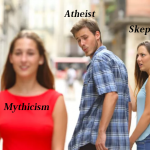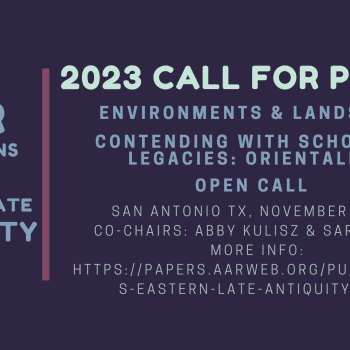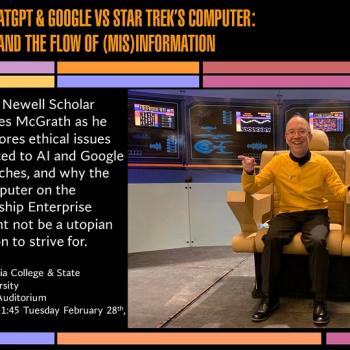When new technology makes a skill more essential than ever, I don’t think we can blame the technology for widespread laziness. True, it is easier than ever to ask a question and get an instant answer. But when, whether, and why one should or should not trust the answer one receives from Google, Wikipedia, YouTube, crowdsourcing, phoning a friend, or any other source is an important and obvious question that everyone ought to have been asking already, and merely continued to ask as new technology arrived.
I am responding here to thoughts shared on the Tech Edvocate blog in a post that lists critical thinking among the skills upon which technological change is having a detrimental impact. That post says:
To think critically means to think about one’s thinking. What must I evaluate and in which context? How do I break a subject down for proper analysis? And finally, how did I come to my conclusion? These are all key steps in solving a problem and/or making a decision. For instructors, administrators, and employers, we know this, but for students who are engrossed in technology, these concepts may be all but lost on them. Why? Technology is often wrought with immediate gratification. Click a button, and your answer appears. No need to evaluate or analyze. No need to think about one’s thinking process.
There was also a good piece in Inside Higher Ed about the limitations of the CRAAP Test. Also on that topic:
https://www.thetechedvocate.org/how-to-be-a-better-web-searcher-secrets-from-google-scientists/
Now for that call for papers (but more links related to this topic follow below, so keep going even if you’re not an academic interested in presenting at a conference on this topic):
https://relcfp.tumblr.com/post/186863291695/cfa-post-truth-perspectives-strategies
And another:
https://relcfp.tumblr.com/post/186792239341/call-for-authors-anti-intellectualism-and
The Chronicle of Higher Education had an article about the role of scholarship (in particular historians) in combatting white nationalism (with a quote from Sarah Bond!)
Inside Higher Ed addressed how to tackle climate change denial
Hank Campbell wrote about using the consensus to persuade people about science
NCSE asked what changes minds about climate change.
This post by Bill Caraher is relevant because he begins, “One of the funny things about expertise is that if you don’t practice being an expert on something, you begin not to be.”
Inside Higher Ed advocated for using facts when addressing bigotry.
Dr. Lee McIntyre — The Scientific Attitude: Defending Science from Denial, Fraud, and Pseudoscience
http://learningaloud.com/blog/2019/07/10/remaining-neutral-when-the-facts-argue-otherwise/
https://friendlyatheist.patheos.com/2019/07/08/fl-principal-who-wanted-to-be-politically-neutral-about-holocaust-loses-job/
https://friendlyatheist.patheos.com/2019/07/28/ken-ham-climate-change-isnt-a-big-deal-since-noah-dealt-with-a-global-flood/
How Noah’s Flood Muddies Evangelical Thinking on Climate Change
https://friendlyatheist.patheos.com/2019/07/09/answers-in-genesis-is-now-fully-running-its-own-creationism-preaching-school/
Ugly theories killed by inconvenient facts
Science is not a corporate conspiracy
New Scientist on Facebook’s new fact-checking process being too opaque to know if it is working
Richard Beck on non-credentialed community
Bob Cornwall offered a book review related to polarization in American politics
https://friendlyatheist.patheos.com/2019/07/09/gallup-confidence-in-organized-religion-is-at-an-all-time-low-again/
https://friendlyatheist.patheos.com/2019/08/09/evangelical-christians-are-the-least-trusted-religious-group-in-new-zealand/
Christian Century asked whether clergy can earn back that trust they’ve lost. Hank Campbell noted recent statistics related to public trust in science and how it compares with other authorities. He also noted Bernie Sanders’ promise to release info on aliens if elected…
When You’re So Paranoid Even Sunday School Teachers Are a Threat
Either You Don’t Know Anything or Most of What You Believe is True
Spider-Man: Far From Home – Truth, Perception, and the Need to Believe
YouTube getting serious on hate speech
The consequences for the Sokal Squared scholar
Deciding what to eat – science and hype
https://friendlyatheist.patheos.com/2019/08/14/a-creationists-critique-of-flat-earthers-inadvertently-disproves-creationism/
https://friendlyatheist.patheos.com/2019/07/26/gallup-40-of-americans-are-creationists-but-a-record-high-22-accept-reality/
https://friendlyatheist.patheos.com/2019/08/14/flat-earthers-homemade-rocket-grounded-due-to-bad-craigslist-water-heater/
https://relcfp.tumblr.com/post/187022977032/cfp-negotiating-academias-relevance-problem
https://relcfp.tumblr.com/post/186908442462/call-for-authors-anti-intellectualism-and













